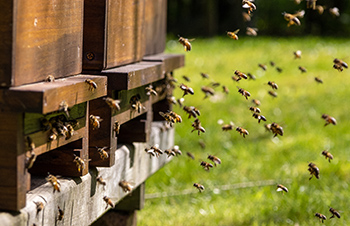Strong Colonies Vital to Blueberry Pollination
According to Oregon State University Extension’s pollinator health specialist, with bees, it’s not always the number of bee colonies, it’s often the strength of the colonies that determines the success of pollination in a blueberry field.
“Strong colonies are almost as important as stocking rates,” said Andony Melathopoulos, associate professor of pollinator health for the OSU Extension Service.
 |
At the Oregon Blueberry Field Day in Aurora July 26, Melathopoulos walked participants through some relatively simple and inexpensive steps to gauge colony strength in a blueberry field.
“It is not a super accurate way of grading colonies,” he said of the method. “It’s not like what you see in California, where growers will hire a contractor to go through a portion of the colonies to grade them. But they’re also paying $250 a colony in California, so that pencils out.
“Here, we aren’t paying that, but we still want to have strong colonies,” Melathopoulos said.
The first step, Melathopoulos said, involves driving around a field a day or two after colonies are dropped and judging the entrance count, or how many bees per minute are going into the colony. Melathopoulos added that OSU Extension developed a video in collaboration with Washington State University, Michigan State University and the University of Florida to help growers understand how to tally colony entrance counts. (https://beav.es/TPg)
“More often than not, there are going to be lots of good, strong colonies and there is not going to be an issue,” he said. “But sometimes the beekeeper comes in with some weaker colonies, and occasionally, even very good beekeepers will come in with a dead colony. You should be able to catch those and pick them out.”
At that point, Melathopoulos said, growers should place flags in front of the weak colonies and contact their beekeeper. “And then you can drive around and have them go through the colonies that you’ve flagged. Going through that process a few times will ensure that you’re getting very high quality bee colonies,” he said.
On another topic, Melathopoulos said that research is showing that bunching colonies at landings has no detrimental effects on pollination compared to dispersing colonies. And, he said, bunching colonies is easier for beekeepers and potentially safer for bees in regard to exposure to pesticides.
“In a study done in Duke, what we’ve seen is there has been no impact if you clump the colonies together in the landing than if you disperse them at the ends of rows,” Melathopoulos said. “You seem to get the same pollination at the same stocking rate.”